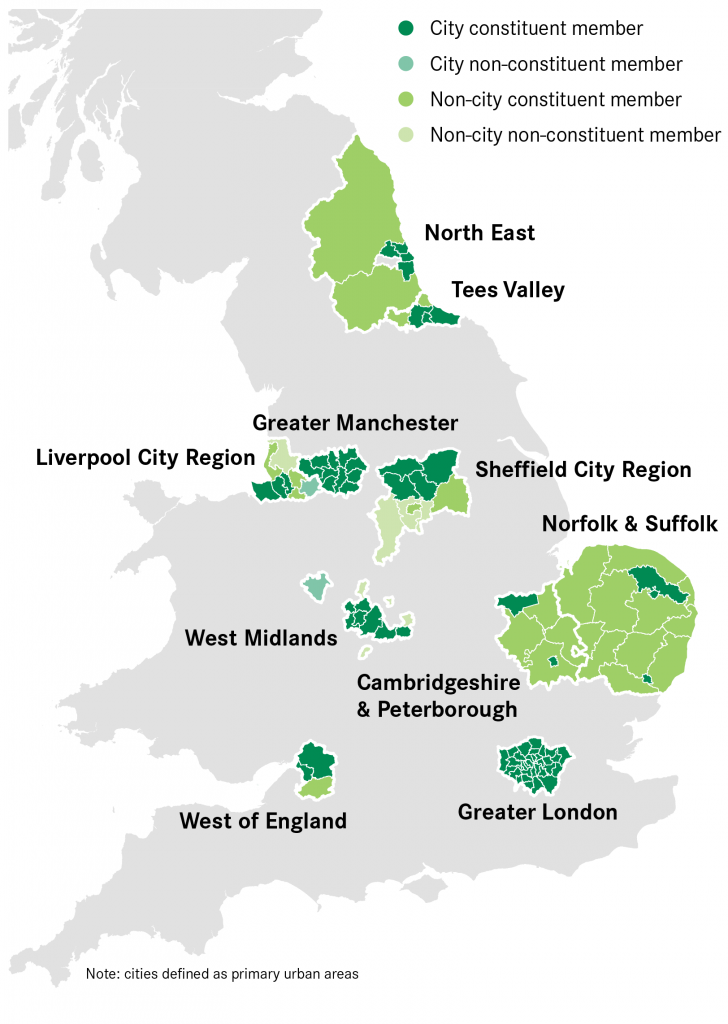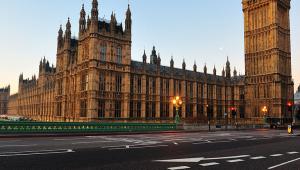Of the many “I’m all for the devolution deals but…” arguments I hear across the country, at events or on Twitter, the one that appears to be gaining most traction since the EU referendum is that the agenda has been too focused on the big cities, to the detriment of devolving to and supporting small and medium sized towns and cities and their rural hinterlands – many of which are now being referred to as “left behind Britain”.
Sadly for the proponents of this view, it doesn’t stand up to much scrutiny. Let’s look just at the deals agreed for the seven big city regions so far – Greater Manchester, West of England, Liverpool City Region, North East, Sheffield City Region, Tees Valley and West Midlands.
Beyond the core city authorities like Manchester, Newcastle and Birmingham, these deals encompass over thirty smaller local authorities like Bolton, Bury, Oldham, Rochdale, Salford, Stockport, Tameside, Trafford, Wigan, Bath, St Helens, Sefton, Knowsley, Wirral, Halton, Durham, Sunderland, Doncaster, Rotherham, Barnsley, Bassetlaw, Chesterfield, Darlington, Hartlepool, Middlebrough, Redcar and Cleveland, Stockton-on-Tees, Wolverhampton, Coventry, Dudley, Sandwell, Solihull and Wallsall. Once you include non-constituent members of some of the deals – those that will attend meetings but not formally vote on decisions – that number swells further to include places like Warrington, Nuneaton and Telford.
Indeed, the areas covered by these deals alone are home to over 11 million people – that’s more than the populations of Wales, Scotland and Northern Ireland combined. Here, for ease of reference, is a map with the latest authorities included in each of the deals agreed to date, including those of Cambridgeshire and Peterborough, and Norfolk and Suffolk.

Centre for Cities
It’s worth contrasting this with previous attempts from the government to devolve powers and introduce mayoral government to England. City Deals round one and two, together with the mayoral referenda of the last Parliament were explicitly focused on single authority areas, and initially at least, did preference securing arrangements with the largest urban authorities.
The current devolution deals have, from the outset, explicitly sought to improve on these previous attempts by focusing on those areas with the biggest growth potential, as well as broadening out the scope of powers on offer, and the scale of area that those powers would cover, so as to better reflect the geography at which people actually live and work.
Devolution within England is therefore not focused on big cities as such, but big city-regions, which take in a whole host of different settlements, from big urban centres, to neighbouring medium sized cities to smaller towns and villages. Indeed it’s clear from looking at the map above that if anything, places have been pragmatic and inclusive when defining the geography of their mayoral deals, with many resembling entire regions, rather than their immediate urban and suburban footprints.
Furthermore, the governance arrangements of these deals will ensure that all individual local authorities within the mayoral combined authority play important roles in terms of setting the strategic direction of the city-region, and when it comes to making important decisions over planning and investing in the drivers of growth.
And there are a number of other deals that could yet be agreed – for example, the Leeds City Region and for the Solent area.
Critics are quite correct that this approach does not allow for the map of England to be filled in – for every part of the country to get a mayoral devolution deal of its own. But then, why should it? Do all settlements require the devolution of the same strategic powers, and are all places ready to receive them at the same time? Of course not. Should those areas where mayoral devolution deals are not appropriate enjoy the benefits of other policy interventions, such as local growth deals or specific support to help deliver housing, infrastructure or skills improvements? Of course they should.
The current wave of devolution deals represent just the first step on the road to decentralising power in the UK, and they should only be viewed as one part of a broader strategy to boost economic growth and improve the life chances of places and people across the country. But let’s be clear – mayoral devolution deals are already about much more than the big cities, and their successful delivery will benefit residents all across urban, suburban, and rural England.
A version of this blog first appeared on the Centre for Cities website





















